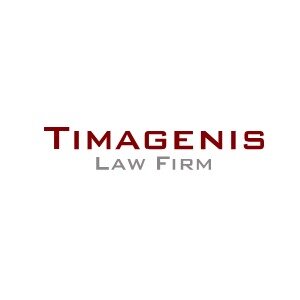Best Private Equity Lawyers in Greece
Share your needs with us, get contacted by law firms.
Free. Takes 2 min.
Or refine your search by selecting a city:
List of the best lawyers in Greece
About Private Equity Law in Greece
Private equity (PE) in Greece is a dynamic area of business that involves capital investments in private companies or the acquisition of public companies to restructure or grow their value. The Greek private equity market has experienced growth in recent years, attracting both domestic and international investors. Private equity transactions are regulated under a combination of Greek corporate, tax, and financial market laws, which oversee fund formation, acquisitions, management, and exit strategies.
Why You May Need a Lawyer
Involvement in private equity can be complex and may expose investors and entrepreneurs to significant legal risks. You may need a lawyer if you are:
- Investing in or establishing a private equity fund
- Acquiring or selling shares in a company
- Negotiating partnership agreements or restructuring corporate entities
- Drafting and reviewing investment documentation and terms
- Managing legal due diligence for potential investments
- Ensuring compliance with Greek regulatory requirements
- Navigating tax considerations and implications
- Resolving disputes among co-investors or with target companies
- Exiting investments via sales, initial public offerings, or other strategies
- Understanding and applying changes to local or EU-wide investment legislation
Legal professionals in private equity safeguard your interests, help you avoid regulatory pitfalls, and streamline complex transactions.
Local Laws Overview
Private equity activity in Greece is governed by several key local laws and regulations, including:
- Greek Company Law - Outlines the procedures for setting up, merging, and dissolving companies, especially Societes Anonymes (SA), the prevalent company type in PE deals.
- Law 2992/2002 - Specific framework governing venture capital companies, including licensing, operational requirements, and investment restrictions.
- Capital Market Commission Regulations - Set rules for investment firms and funds, including obligations for transparency and investor protection.
- European Union Directives - The AIFMD and other EU legislation, transposed into Greek law, provide additional regulatory oversight, especially for cross-border investments.
- Tax Legislation - Rules regarding capital gains, dividend distributions, and corporate structuring are particularly relevant for fund managers and investors.
- Antitrust and Competition Laws - Regulate mergers, acquisitions, and joint ventures to prevent unfair market dominance.
It is critical for parties involved in private equity transactions to follow these laws to ensure compliance and avoid penalties or delays.
Frequently Asked Questions
What is private equity investing in Greece?
Private equity investing involves providing capital to private companies or buying out public companies with an aim to restructure, grow, or eventually sell them for a profit. In Greece, these activities are regulated by both national and EU laws.
Who regulates private equity funds in Greece?
The Hellenic Capital Market Commission supervises the activities of investment funds and managers, ensuring compliance with licensing and operational standards.
Can foreign investors participate in private equity in Greece?
Yes, Greece welcomes foreign direct investment in private equity, provided that investors comply with local laws, including reporting and authorization requirements.
What types of entities are used for private equity funds in Greece?
Most private equity funds are structured as Societes Anonymes (SA) or venture capital companies under Greek law, complying with both corporate and financial market regulations.
What is the due diligence process in Greek private equity?
Due diligence involves a comprehensive evaluation of a target company's legal, financial, and operational status. It covers reviewing corporate documents, financial records, contracts, employee matters, litigation risks, and regulatory compliance.
Are there any restrictions on investment sectors in Greece?
While most sectors are open to private equity, certain strategic sectors such as defense, media, and utilities may have additional approvals or restrictions for both local and foreign investors.
How is taxation handled for private equity returns?
Profit from private equity investments, including capital gains and dividends, is subject to Greek tax laws. Specific rates and exemptions may apply depending on the structure of the investment and any applicable double taxation treaties.
What are the main steps in a private equity transaction in Greece?
A typical process includes deal sourcing, negotiations, drafting legal documents, conducting due diligence, securing regulatory approvals, finalizing the transaction, and managing exit strategies.
Do private equity deals in Greece require regulatory approvals?
Some transactions, especially those above certain thresholds or in regulated sectors, may require approval from the Hellenic Competition Commission or other authorities.
How do private equity firms exit investments in Greece?
Common exit routes include trade sales to strategic buyers, initial public offerings on local or foreign stock exchanges, and secondary buyouts to other private equity funds.
Additional Resources
Several organizations and institutions provide valuable resources on private equity in Greece:
- Hellenic Capital Market Commission (HCMC): Supervises market activities and issues regulations.
- Hellenic Venture Capital Association (HVCA): Represents the interests of private equity and venture capital firms in Greece.
- Hellenic Competition Commission: Oversees merger control and antitrust matters.
- Ministry of Development and Investments: Offers information on foreign investment incentives and company establishment.
- European Investment Fund (EIF): Engages in private equity initiatives across Europe, including Greece.
Consulting these organizations can help you stay updated on regulatory developments, industry best practices, and market opportunities.
Next Steps
If you need legal assistance in private equity in Greece, consider the following steps:
- Identify your specific legal needs, whether they involve investment, compliance, documentation, or dispute resolution.
- Contact a reputable law firm or lawyer specializing in private equity and corporate transactions.
- Prepare any documents or information related to your proposed investment or business activities.
- Schedule a consultation to discuss your objectives, risks, and questions.
- Work with your lawyer to conduct due diligence, draft agreements, and ensure all regulatory requirements are met.
- Stay informed about changes in local laws and market conditions to make well-founded decisions.
Navigating private equity in Greece can be complex, but with qualified legal support, you can address challenges, minimize risks, and maximize your investment potential.
Lawzana helps you find the best lawyers and law firms in Greece through a curated and pre-screened list of qualified legal professionals. Our platform offers rankings and detailed profiles of attorneys and law firms, allowing you to compare based on practice areas, including Private Equity, experience, and client feedback.
Each profile includes a description of the firm's areas of practice, client reviews, team members and partners, year of establishment, spoken languages, office locations, contact information, social media presence, and any published articles or resources. Most firms on our platform speak English and are experienced in both local and international legal matters.
Get a quote from top-rated law firms in Greece — quickly, securely, and without unnecessary hassle.
Disclaimer:
The information provided on this page is for general informational purposes only and does not constitute legal advice. While we strive to ensure the accuracy and relevance of the content, legal information may change over time, and interpretations of the law can vary. You should always consult with a qualified legal professional for advice specific to your situation.
We disclaim all liability for actions taken or not taken based on the content of this page. If you believe any information is incorrect or outdated, please contact us, and we will review and update it where appropriate.
Browse private equity law firms by city in Greece
Refine your search by selecting a city.

















